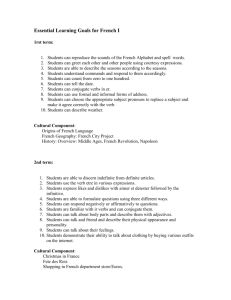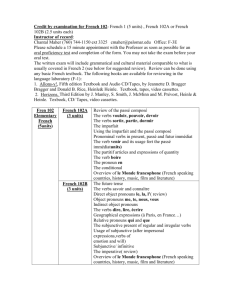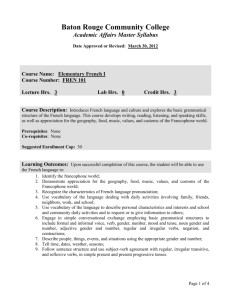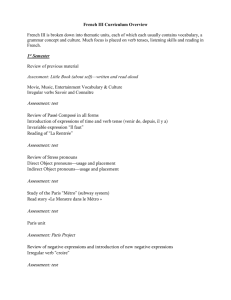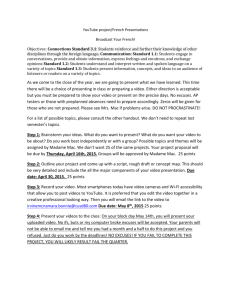French V - Neshaminy School District
advertisement
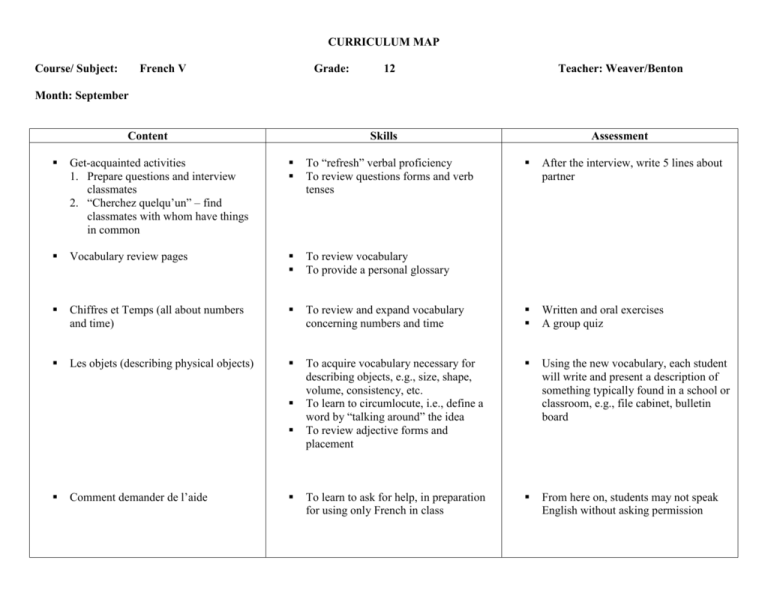
CURRICULUM MAP Course/ Subject: French V Grade: 12 Teacher: Weaver/Benton Month: September Content Skills Get-acquainted activities 1. Prepare questions and interview classmates 2. “Cherchez quelqu’un” – find classmates with whom have things in common To “refresh” verbal proficiency To review questions forms and verb tenses Vocabulary review pages To review vocabulary To provide a personal glossary Chiffres et Temps (all about numbers and time) Les objets (describing physical objects) Comment demander de l’aide Assessment After the interview, write 5 lines about partner To review and expand vocabulary concerning numbers and time Written and oral exercises A group quiz To acquire vocabulary necessary for describing objects, e.g., size, shape, volume, consistency, etc. To learn to circumlocute, i.e., define a word by “talking around” the idea To review adjective forms and placement Using the new vocabulary, each student will write and present a description of something typically found in a school or classroom, e.g., file cabinet, bulletin board To learn to ask for help, in preparation for using only French in class From here on, students may not speak English without asking permission Caractère et Personnalité Poster de Moi Essential Questions: 1. How can I describe simple objects in French, according to size, shape, texture, and purpose? 2. How can I describe my past, my present, and my intended future in French? What are my likes and dislikes? To acquire new vocabulary concerning character and personality To practice irregular adj. To expand on the placement of adj. 1. before and after group 2. beyond BAGS To make a visual display of student’s past, present and future life To be able to use all of the above (vocabulary, numbers, dates, adjectives, verbs) in an oral presentation Graded written assignment using all adj. forms Conversation in which “child” convinces “parent” to accept a new friend by describing his/her character traits Oral presentation (mid-October), using only the poster (no written script) CURRICULUM MAP Course/ Subject: French V Grade: 12 Teacher: Weaver/Benton Month: October Content Reflexive verbs Conjunctions, e.g., therefore, whereas Futur et Conditionnel Pronunciation Skills Assessment To review reflexive verbs in all forms, i.e., single verb, passé compose, verb + infinitive To expand vocabulary Written quiz Oral interviews, using reflexive verbs related to relationships, e.g., to get along, to argue, etc. To review verb forms To practice “Si” clauses To use future with quand, lorsque, etc. To practice the polite conditional To be included on the oral presentation for their “Poster de Moi” Translation exercise To be able to pronounce the French “R” To focus on particular vowel combinations Recite a poem which includes all of the most important sounds. Must score at least 22/25. Oral presentations – “Moi” Essential Questions: 1. How can I perfect the pronunciation of the French “R”? 2. Am I able to use the future and conditional tenses correctly to describe “If” situations and result clauses? 3. Do I understand the rhyme, imagery and meaning of Paul Verlaine’s “Chanson d’automne”, and am I able to recite it? CURRICULUM MAP Course/ Subject: French V Grade: 12 Teacher: Weaver/Benton Month: November and December Content Skills Assessment é “Mon portrait de A à Z” 1. Read the interview that appeared in Paris Match 2. In groups, identify structures and themes in sample portrait which will be required in own portrait To write an autobiographical sketch, using the alphabet to organize themes To incorporate all of the grammatical points already reviewed To use new vocabulary Written (typed) self-portrait using 22 of the 26 letters in the alphabet and a list of structures To find and read news articles related to any French-speaking country To look for the “who, what, when, etc.” in those articles To simplify and explain own article Oral report to the class (2-3 per week at the beginning of class for the balance of the marking period) (End of first marking period) Reportages 1. In groups, read and analyze news articles provided by teacher 2. Practice presenting to class Les adverbes To learn formation and practice placement of adverbs Written quiz “Le Horla” 1. Who was Guy de Maupassant? 2. Why this story? 3. Introduce PLN technique, using worksheets To read a famous story in its original version To apply reading techniques from PLN course To be able to discuss story in French Comprehension quizzes in French and English Written summaries of parts of story Oral test at the end Irregular verbs like souffrir and apercevoir To use these verbs in the telling of the story Verb exercises Differences between imparfait and passé composé To relate a story in the past using the correct past tense Passé simple To be able to read and understand the literary past Project – Pays francophones 1. Choose a country 2. Begin research To learn about a French-speaking country not previously studied in depth Essential questions: 1. Can I write a self-portrait that incorporates appropriate cumulative grammar? 2. Who was Guy de Maupassant? Do I understand his story, “Le Horla”, and am I able to describe it in French? 3. What do I know about a French-speaking country, and what did I learn and share with my class by researching a current news item there? 4. Can I read, understand, and use the passé simple tense correctly? To be able to write about and present orally the information found Description of the patient’s symptoms and the actions he took Verb exercises (changing passé composé to passé simple and vice versa) Poster or booklet with all required information (2nd marking period) Oral presentation with Power Point for those who chose to make a booklet (3rd marking period) CURRICULUM MAP Course/ Subject: French V Grade: 12 Teacher: Weaver/Benton Month: January and February Content “Le Horla” (cont.) Skills To review story in preparation for written and oral test To prepare own vocabulary list to be used during test Project – Pays francophones (cont.) Assessment Test – 6 questions 1. 3 Oral 2. 3 Written Poster or booklet due (End of 2nd marking period) Foods and recipes To expand foods vocabulary To learn recipe vocabulary To translate recipes from French to English Translation exercise Recipe translation as part of Pays francophones project Articles and quantities To review the use of definite, indefinite and partitive articles Written exercises using all articles with foods Object pronouns Double object pronouns To use the object pronouns correctly To use more than one object pronoun in a sentence Quiz on articles, quantities and pronouns L’Afrique francophone To understand issues concerning French-speaking Africa, e.g., immigration, racism, religion Comprehension questions (quiz) on reading Class discussion about reading Movie “Au revoir les enfants” Relative pronouns Essential Questions : 1. What is a recipe of a food typical of the French-speaking country I have researched ? Can I express that recipe in French ? 2. What are some current issues concerning French-speaking Africa ? 3. How does the French movie, Au revoir les enfants, help my understanding of the problems of racism and tolerance ? To watch a French movie set in France during WWII To learn about France during WWII To continue discussion of racism and tolerance Notes taken during the film Class discussion of film and the main characters To be able to use the relative pronouns correctly in complex sentences Written description of main characters (personality traits with examples) CURRICULUM MAP Course/ Subject: French V Grade: 12 Teacher: Weaver/Benton Month: March Content Project – Pays francophones Skills Essential Questions: 1. What did I learn about the French-speaking country that I researched, with particular attention to the topics of unemployment, AIDS, illiteracy, pollution, cultural and religious traditions, and government? 2. What did I learn about the other countries that my classmates spoke about? To speak in French for 10-15 minutes, using notes but no script To understand what classmates are saying about their countries To take notes about other countries To compare and contrast countries and regions 1. Location 2. Problems, e.g., unemployment, AIDS, illiteracy, pollution 3. Cultural and religious traditions 4. Government Assessment Oral presentation, using poster and/or Power Point Written translation of typical recipe Notes on each presentation Test on all countries CURRICULUM MAP Course/ Subject: French V Grade: 12 Teacher: Weaver/Benton Month: April – May (1st half) Content “Comte de Monte Cristo” Skills Subjunctive Essential Questions: 1. Do I understand Alexandre Dumas’ work, Comte de Monte Cristo, after reading excerpts from the book? 2. Can I successfully debate the concept, “Is vengeance right or wrong?” 3. Can I use the subjunctive and the past subjunctive moods correctly to explain event in Dumas’ story? Assessment To read and understand this famous story To understand the historical context To expand working vocabulary To discuss the idea of vengeance Comprehension quizzes Chapter notes and summaries Debate (oral participation) – Is vengeance right or wrong? To learn the forms of the subjunctive To use the expressions which require the subj. – WEIRD To be able to use the past subjunctive Verb quizzes Written explanation of the story, using verbs in the subjunctive CURRICULUM MAP Course/ Subject: French V Grade: 12 Teacher: Weaver/Benton Month: May (2nd half) - June Content Livre pour enfants Essential Questions: 1. Am I able to create an original children’s story in French and illustrate it in the form of a small book? 2. Can I use aspects that I have learned about a French-speaking country in my story? Skills To write and illustrate a children’s story To use all structures studied this year To incorporate aspects of the Frenchspeaking country from the project into the story Assessment Children’s story
